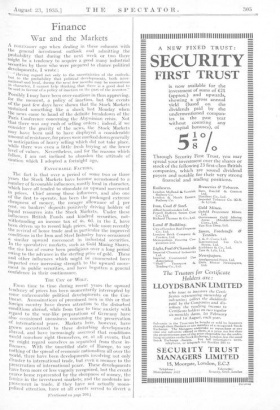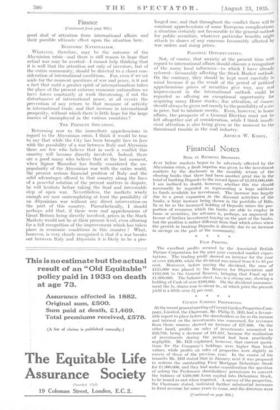Finance
War and the Markets
A FORTNIGHT ago when dealing in these columns with 'the general investment outlook and admitting the probability that during the next week or two there 'might be a tendency to acquire a good many industrial securities by those' who were prepared to chance political developments, I wrote : . "Having regard not only to the uncertainties of the outlook, but to the probability that political' developments, both inter- national and local, during the next few months may be momentous in character, I cannot help thinking that there is a good deal to be said in favour of a policy of inaction on the part of the investor." Possibly I may have been over-cautious in thus approving, for the moment, a policy of inaction, but the events of the past few days have shown that the Stock Markets 'sustained something like a shock last Monday when 'tie news came to hand of the definite breakdown of the Paris Conference concerning the Abyssinian crisis. Not that there Was any rush of selling orders ; indeed, if we `Consider the gravity of the news. the Stock Markets .thaY have been said to have displayed a considerable `amount of resistance; for prices were marked down generally 'in anticipation of heavy selling which did not take place, 'while there was even a little fresh buying at the lower level of values. • Nevertheless, and for the reasons which follow, I am not inclined to abandon the attitude of' Caution which I adopted a fortnight ago.
FAVOURABLE FACTORS.
The fact is that over a period of some two or three Years the Stock Markets have become accustomed to a number of favourable influences, mostly local in character, Which have all tended to stimulate an upward movement in prices. Chief among those influences, and also one of the first to operate,' has been the prolonged extreme cheapness of money, the meagre allowance of per cent. on bankers' deposits positively driving holders of liquid resources into the Stock Markets. Under these influences British Funds and kindred securities, not- withstanding, an income tax of 4s. 6d. in the 1, have been driven up to record high prices, while more recently the revival of home trade and in particular the improved conditions in the Iron and Steel Industry have occasioned a similar upward movement in industrial securities. In the speculative markets, such as Gold Mining Shares, the rise has of course been prodigious over a long period °wing to the advance in the sterling price of gold. These and other influences which might be enumerated have imparted ever increasing strength to the upward move- inent in public securities, and have begotten a general confidence in their continuance.
THE CRY OF WOLF.
recent years the upward From time to time during tendency of prices has been momentarily interrupted by 01"11e unfavourable political developmentS on the Con- tinent. Assassinations of prominent men in this or that foreign country have drawn attention to the disturbed conditions abroad, while from time to time anxiety with regard to the war-like preparations of Germany have also occasioned uneasiness concerning the preservation of international peace. Markets here, however, have grown accustomed to these disturbing developments abread, and have increasingly assumed that conditions Would somehow right themselves, or, at all events, that Nye might regard ourselves as separated from these in- fluences. With the unsettled state of Europe, to say nothing of the spread of economic nationalism all over the warld, there have been developments involving not only disaster to international trade, but even a menace to the preservation of international peace. These developments have been more or less vaguely recognized, but the events nearer home represented by the cheapness of money, the famine in the investment markets, and the moderate im- provement in trade, if they have not :lethally Mono- polized attention; have at all events served to divert "a (Continued on page 308.).
Finance
(Continued from page 305.)
,good deal of attention from international affairs and their possible ultimate effect upon the situation here.
ECONOMIC NATIONALISM.
' Whatever, therefore, may be the outcome of the Abyssinian. crisis—and there is still reason to hope that actual war may be averted—I cannot help thinking that it is well that the attention not only of investors, but of the entire community, should be directed to a closer con- iideration of international conditions. For, even if we set aside for the moment questions of war and peace, is it not. a fact that until a greater spirit of internationalism takes the place of the present extreme economic nationalism we have forces constantly at work threatening, if not the disturbances of international peace, at all events the prevention of any return to that measure of activity in international trade, and that increase in international prosperity, without which there is little hope for the large masses of unemployed in the various countries ?
THE PRESENT SITUATION.
Returning now to the immediate apprehensions in regard to the Abyssinian crisis, I think it would be true to say that while the City has been brought face to face with the possibility of a war between Italy and Abyssinia there are few who believe that in such a conflict this country will become directly involved. Indeed, there are a good many who believe that at the last moment, When Signor Mussolini has finally considered the un- popularity of the Abyssinian war with the entire world, the present serious financial position of Italy and the solid advantages offered to that country along the lines of a peaceful solution of the present matters in dispute, he will hesitate before taking the final and irrevocable step of open war. Nevertheless, 'the markets wisely enough are now contemplating at least the possibility of an Abyssinian war without any direct intervention on the part of this country. Parenthetically, I should perhaps add that, if there were real apprehensions of Great Britain being directly involved, prices in the Stock Markets would not be at their present level, even- allowing for a fUll recognition of the improvement which has taken place in economic conditions in this country ! What, however, is very clearly recognized is that if a war breaks out between Italy and Abyssinia it is likely to be a pro- longed one, and that throughout the conflict there will be constant apprehensions of some European complications, a situation certainly not favourable to the general outlook for public •securities, whatever particular benefits might attach to shares of any concerns favourably affected by war orders and rising prices.
POSSIBLE OPPORTUNITIES.
Not, of course, that anxiety at the present time with regard to international affairs should obscure a recognition of the many local influences—to which I have already referred—favourably affecting the Stock Market outlook. On the contrary, they should be kept most carefully in mind because if as the result of the period of political apprehensions prices of securities give way, any real improvement in the international outlook could be regarded as offering an exceptional opportunity for acquiring many Home stocks ; due attention, of course, should always be given not merely to the possibility of a rise in price, but to intrinsic merits. Even, however, in home affairs, the∎ prospects of a General Election must not be left altogether out of consideration, while I think insuffi- cient attention is also being given at the moment to the threatened trouble in the coal industry.
ARTHUR, W. KIDDY.



































 Previous page
Previous page